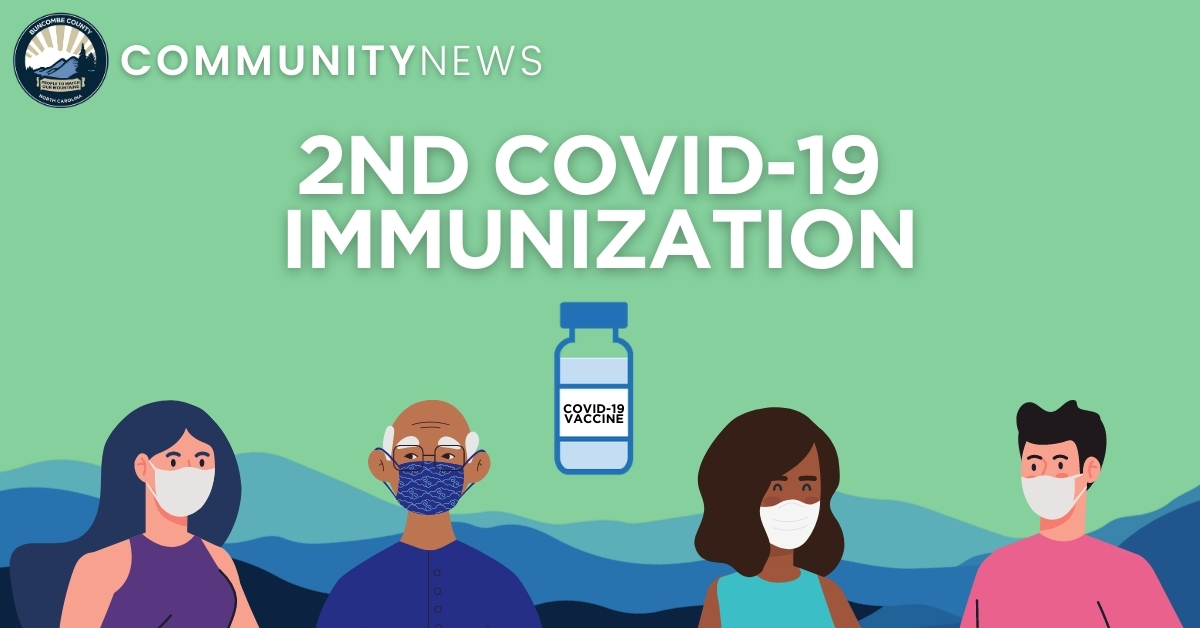This news item expired on Tuesday, March 1, 2022 so the information below could be outdated or incorrect.

View upcoming Buncombe County Vaccination Clinic Dates and Times
Congratulations on receiving your first dose of the COVID-19 vaccine, and thank you for taking steps to protect yourself and your community. Remember, the level of protection increases dramatically after receiving the second shot of the vaccine. Second shots also provide longer-lasting immunity compared to a single dose.
Please bring your vaccination card and insurance card to the second dose site.
Please bring your vaccination record card with you to your second immunization appointment. You will also need to fill out a consent form and provide your insurance card (if you have one, not mandatory) when receiving your second dose. The process is very similar to the experience of receiving the first vaccination. Please wear clothes that allow access to your upper arm. Dresses, bulky clothes, and jackets can make it hard to access your arm. Please wear a face covering while you are at the vaccination site, especially if you carpool with others who live outside of your household.
Both first, second, and booster doses will be administered at Buncombe County Health and Human Services located at:
Buncombe County Health and Human Services
40 Coxe Ave, Asheville, NC 28801
Our vaccination site is ADA accessible and has Spanish medical interpreters on-site.
How much does the vaccine cost?
There is no cost for the vaccine.
What are common side effects or immune responses after receiving COVID-19 vaccines?
Short-Term: The majority of short-term effects reported in clinical trials were mild to moderate and occurred within the first few days of receiving a COVID-19 vaccine. Examples of common mild to moderate immune responses include pain at the injection site, headache, fatigue, fever, or chills. This does not mean you are developing COVID-19 – there is no COVID-19 in the vaccine.
The second dose remains essential for maximum protection, and it is worth noting that clinical trials showed stronger immune responses after the second dose.
Long-Term: Historically, long-term side effects from vaccines have been rare and most side effects have been seen within the first 60 days of receiving vaccines.
Before vaccination, COVID-19 vaccine recipients will be counseled about expected local (e.g., pain, swelling, erythema at the injection site) and systemic (e.g., fever, fatigue, headache, chills, myalgia, arthralgia) post-vaccination symptoms.
If I develop COVID-19 symptoms after getting the vaccine, should I quarantine?
Yes. It typically takes a few weeks for the body to build immunity after the second dose of the vaccine. It is possible for a person to be infected with the virus that causes COVID-19 just before or after vaccination and get sick, as the vaccine has not had enough time to provide protection for disease.
Individuals who have COVID-19 virus symptoms after getting the vaccine or at any time should contact a health care provider and consider getting tested for COVID-19.
Do I need to quarantine if I am exposed between doses?
If exposure occurs between doses, follow quarantine guidance as advised by the local health department. Quarantine is used to keep someone who might have been exposed to COVID-19 away from others. Quarantine helps prevent spread of disease that can occur before a person knows they are sick or if they are infected with the virus without feeling symptoms.
Do I still need to wear a mask and take other COVID-19 precautions after I get the vaccine?
Yes. Wearing a mask, washing hands, and staying at least 6 feet away from others will remain important after receiving the vaccine.
Additionally, as the length of immunity is unknown, infection after a receiving a vaccine is still possible. It is likely that infection after receiving the COVID-19 vaccine would be less severe, with mild or asymptomatic conditions.
Other factors for continuing precautions include how many people get vaccinated and how the virus is spreading in North Carolina communities.
I have/had COVID. When can I get the vaccination?
If you tested positive for COVID-19, you should wait to get your COVID-19 vaccine until you have recovered from your illness and have met the criteria to be released from isolation. If you were treated with monoclonal antibodies or convalescent plasma, you should wait 30 days before getting vaccinated.